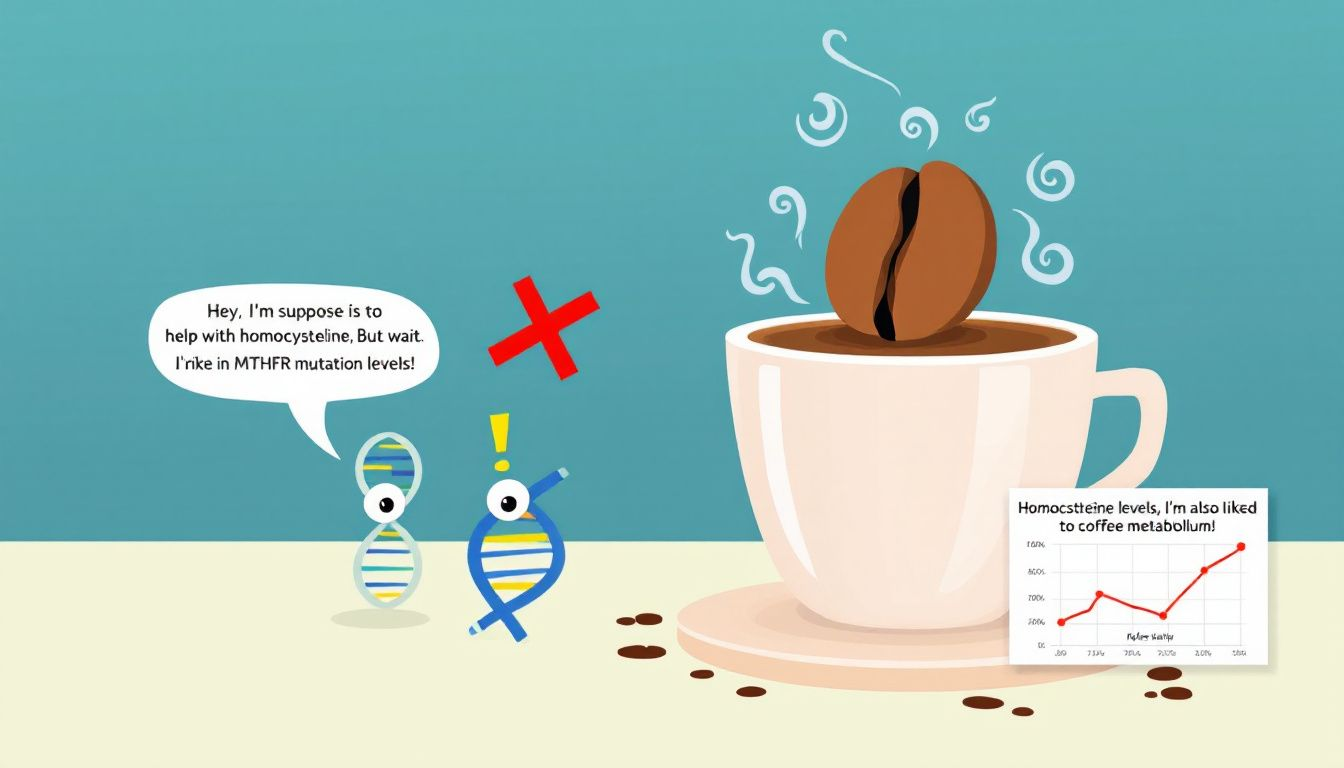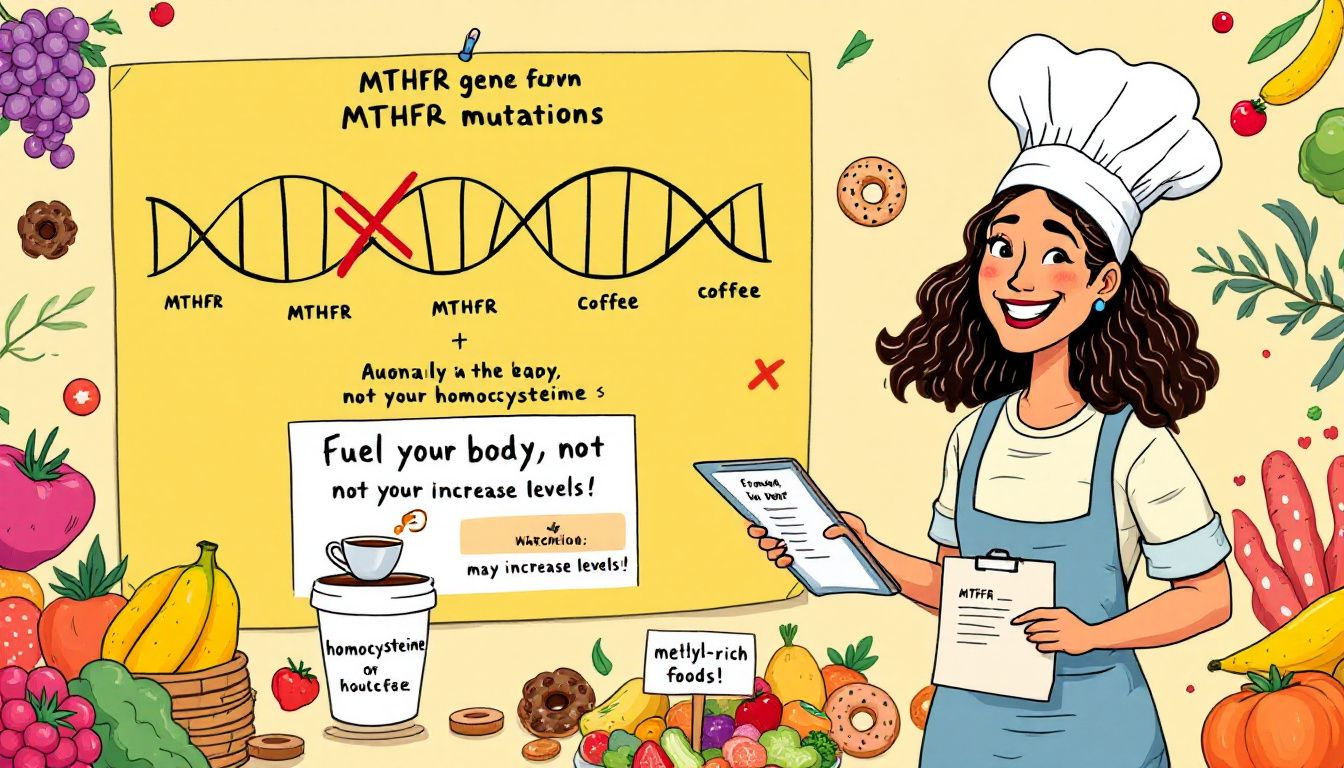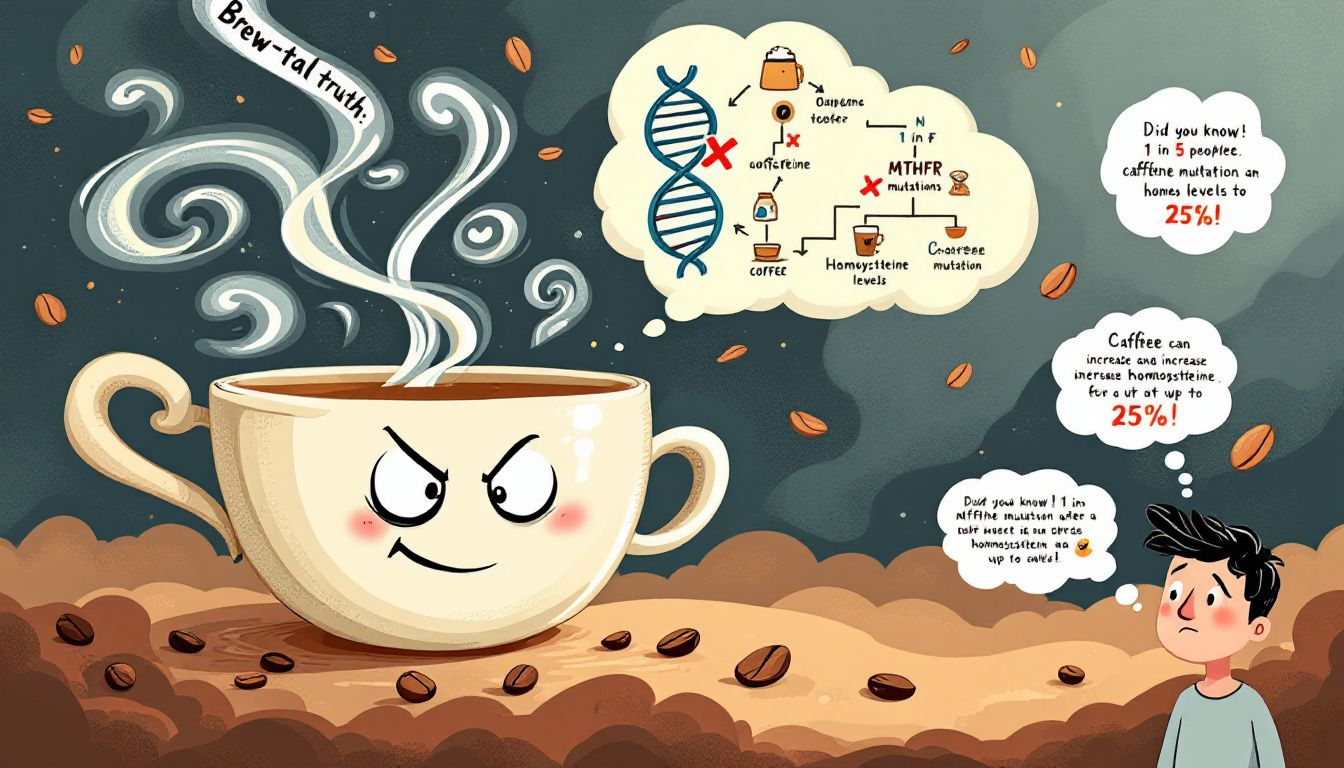If you have an MTHFR mutation and enjoy coffee, you may be wondering how your daily cup affects your health. This article explores the impact of coffee on those with MTHFR mutations, particularly regarding mthfr and coffee, and offers guidance on managing coffee intake.
Key Takeaways
MTHFR gene mutations hinder methylation and can lead to health issues, including elevated homocysteine levels, which increase cardiovascular risks.
Coffee consumption can raise homocysteine levels, especially in individuals with MTHFR mutations, necessitating moderation to balance its benefits and risks.
A proper diet emphasizing natural folate and B vitamins, along with lifestyle changes like exercise and stress management, is essential for managing the health impacts of MTHFR mutations.
Understanding MTHFR Gene Mutation

Located on chromosome 1, the MTHFR gene produces an enzyme called methylenetetrahydrofolate reductase, vital for methylation. Methylation is essential for DNA creation and the conversion of folate and folic acid into forms the body can use. However, when there are mutations in the MTHFR gene, these processes can be disrupted, leading to a variety of health issues.
People with MTHFR mutations often struggle to metabolize homocysteine, an amino acid linked to cardiovascular disease when present in high levels. Although MTHFR mutations by themselves do not directly cause health problems, they can exacerbate other conditions due to impaired nutrient absorption and detoxification processes.
Understanding the types and effects of these mutations is the first step in managing their impact on health.
Types of MTHFR Mutations
MTHFR mutations can be categorized into two main types: heterozygous and homozygous. In a heterozygous mutation, only one copy of the gene is altered, whereas in a homozygous mutation, both copies are affected.
These variations impact enzyme function differently, influencing how well the body can process nutrients and manage methylation.
How MTHFR Mutation Affects Health
The repercussions of MTHFR mutations on health are significant due to their impact on methylation. This process is crucial for detoxification, DNA synthesis, and overall health. Individuals with MTHFR mutations often face an increased risk of cardiovascular diseases and nervous system disorders due to folate deficiency. Problems with homocysteine metabolism can also lead to conditions such as depression and coronary heart disease.
Those with MTHFR mutations often struggle to convert folic acid into its active form, folate, which is essential for good health. Thus, they are advised to consume foods high in natural folate and vitamin B12 and avoid synthetic folic acid supplements. This dietary approach helps manage the associated health risks and supports overall well-being.
Coffee Consumption and MTHFR Mutation

Understanding the effects of coffee consumption is crucial for individuals with MTHFR mutations. Caffeine can elevate homocysteine levels, particularly in those with the MTHFR C677T mutation, increasing cardiovascular risk.
Therefore, monitoring coffee consumption is necessary to mitigate potential health risks.
Potential Benefits of Coffee for MTHFR Mutation
Despite the risks, coffee offers several health benefits, even for those with MTHFR mutations. It is associated with improved mental alertness and mood due to its action on adenosine receptors, which releases more dopamine. Coffee also contains compounds that may help prevent diseases like gallbladder disease, type 2 diabetes, and Parkinson’s disease.
These benefits must, however, be balanced with potential risks. For individuals with MTHFR mutations, moderation is key. Coffee can enhance daily wellness, but its consumption should be managed carefully to avoid adverse effects.
Risks of Coffee for Individuals with MTHFR Mutation
A main risk of coffee consumption for individuals with MTHFR mutations is the significant rise in homocysteine levels it can cause. This effect is due not only to caffeine but also to other compounds in coffee, which can exacerbate the health risks associated with elevated homocysteine levels.
Managing Coffee Intake with MTHFR Mutation
It’s crucial for individuals with MTHFR mutations to manage their coffee intake to minimize health risks related to elevated homocysteine levels. Carefully monitoring and adjusting coffee consumption allows individuals to enjoy its benefits while mitigating adverse effects.
Recommended Coffee Intake
Limiting coffee consumption to about 1-2 cups per day is generally recommended for those with MTHFR mutations. This moderate intake helps manage homocysteine levels while still allowing individuals to enjoy their coffee without significant health risks.
Alternatives to Coffee
Herbal teas and decaffeinated coffee serve as excellent alternatives for reducing caffeine intake. These options can help maintain the ritual of a warm beverage without the associated risks of caffeine on homocysteine levels.
Nutritional Considerations for MTHFR Mutation

Diet plays a crucial role in managing the health impacts of MTHFR mutations. Following an MTHFR diet helps offset nutritional deficiencies and prevent complications. Such a diet emphasizes the consumption of folate-rich foods and essential vitamins.
Folate vs. Folic Acid
Prioritizing natural folate sources over synthetic supplements like folic acid is recommended for individuals with MTHFR mutations. Folic acid may not be effectively converted into its active form in these individuals, making natural folate from foods like leafy greens and legumes more beneficial.
Importance of B Vitamins
B vitamins, particularly B6 and B12, are crucial for managing homocysteine levels and supporting methylation processes. These vitamins help maintain optimal homocysteine levels, thus reducing the risk of associated health issues and can also help increase homocysteine.
Foods to Include and Avoid
A diet rich in folate and B vitamins is recommended for those with MTHFR mutations. This includes natural food sources like leafy greens, legumes, and eggs while avoiding processed foods and synthetic supplements.
Impact of Caffeine on Homocysteine Levels

Caffeine’s impact on homocysteine levels is an important consideration for individuals with MTHFR mutations. Elevated homocysteine due to caffeine poses significant health risks, highlighting the need to understand these biochemical interactions.
Mechanisms of Homocysteine Increase
Caffeine alters various biochemical pathways, impacting methionine metabolism and inhibiting enzymes that regulate homocysteine levels. This inhibition can lead to elevated homocysteine, increasing the risk of cardiovascular issues.
Mitigating the Effects of Caffeine
Counteracting caffeine’s effects involves increasing B vitamins and natural folate intake. Green leafy vegetables and legumes, rich in these nutrients, can help manage homocysteine levels.
Lifestyle Tips for Those with MTHFR Mutation

Lifestyle changes significantly impact the management of MTHFR mutations. Moderating coffee consumption and adopting stress-reduction techniques are key steps.
Exercise and Stress Management
Regular physical activity and stress management techniques like yoga and meditation improve overall health for individuals with MTHFR mutations. These practices help mitigate stress and enhance mood and energy levels.
Regular Health Monitoring
Routine health screenings are vital for tracking homocysteine levels and preventing complications associated with MTHFR mutations. Regular check-ups help identify potential issues early, allowing for timely adjustments in health strategies.
Summary
In summary, understanding the MTHFR gene mutation and its interaction with coffee consumption is vital for managing health. By balancing coffee intake, following a nutrient-rich diet, and adopting a healthy lifestyle, individuals with MTHFR mutations can mitigate potential risks and enhance their overall well-being.
Frequently Asked Questions
What is the MTHFR gene mutation?
The MTHFR gene mutation affects the enzyme responsible for methylation and homocysteine metabolism, which can significantly influence your overall health. Proper functioning of this enzyme is essential for numerous bodily processes.
How does coffee consumption affect individuals with MTHFR mutations?
For individuals with MTHFR mutations, it is crucial to moderate coffee consumption, as it can elevate homocysteine levels and increase cardiovascular risks. Prioritizing a balanced diet and consulting healthcare professionals can help mitigate these effects.
What are the recommended dietary practices for individuals with MTHFR mutations?
Individuals with MTHFR mutations should focus on a diet rich in natural folate and B vitamins while avoiding synthetic folic acid and processed foods. This approach helps mitigate nutrient deficiencies effectively.
Are there safer alternatives to coffee for individuals with MTHFR mutations?
Herbal teas and decaffeinated coffee are safer alternatives for individuals with MTHFR mutations, as they help reduce caffeine intake while preserving the comforting routine of enjoying a warm beverage.
Why is regular health monitoring important for individuals with MTHFR mutations?
Regular health monitoring is crucial for individuals with MTHFR mutations as it allows for tracking homocysteine levels and preventing potential complications such as cardiovascular diseases. Timely adjustments in health strategies can significantly improve overall well-being.

